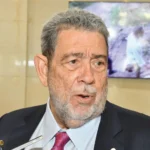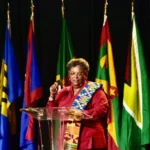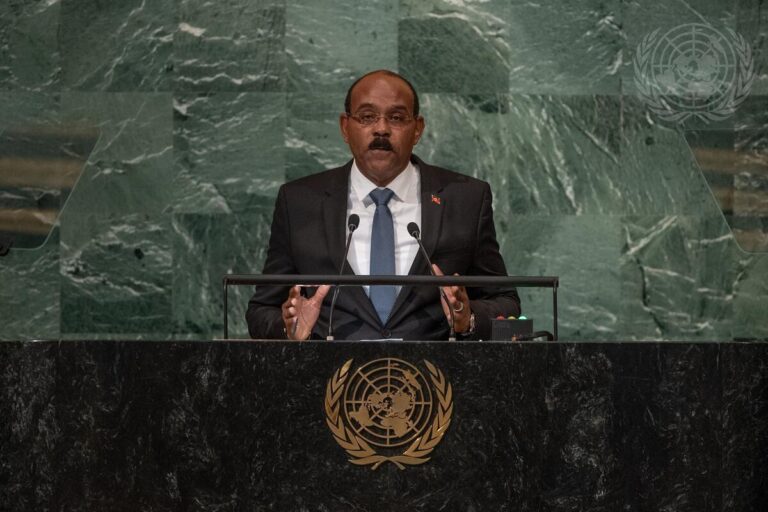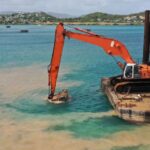GOVERNMENT OF ANTIGUA AND BARBUDA
Statement by The Honourable Gaston Browne Prime Minister of Antigua and Barbuda at the 77th Session of the UN General Assembly New York on September 23rd, 2022
Your Excellency, Ambassador Csaba Kőrösi, President of this 77th Session of the UN General Assembly
Your Excellency, António Guterres, Secretary-General
Distinguished Delegates
Ladies and Gentlemen
As high representatives of our world’s nations gather at this 77th Session of the UN General Assembly, our peoples would have been right to expect greater achievement of global peace and prosperous development.
It has not happened
Seventy-seven years have passed since the leaders of the world’s big powers promised the international community that they would: “save succeeding generations from the scourge of war” and “promote social progress and better standards of life in larger freedom”.
The five victorious nations of the Second World War assigned to themselves, permanent membership of the UN Security Council.
They assumed the responsibility to implement the promises of the Charter not only in their own interests, but also on behalf of the many nations, which did not choose them, and which had no option but to trust them.
Mr. President, the state of today’s world does not readily inspire such trust.
Instead, it arouses an overwhelming sense of disappointment.
It is a disappointment, that small countries, such as mine, would be less than candid, less than honest, if we did not convey our sentiments to the permanent members of the Security Council.
We are obliged to ask: What happened to the commitments, which were chiseled into the UN Charter, as binding obligations on all, but particularly those in the Security Council, who took to themselves the task of guardianship of peace and development?
Lest we have forgotten; let my small nation remind all here gathered of those commitments, for they are commitments we took seriously and expected to be fulfilled.
Commitments:
“to practice tolerance and live together in peace with one another as good neighbours, and to unite our strength to maintain international peace and security, and to ensure, by the acceptance of principles and the institution of methods, that armed force shall not be used, save in the common interest, and to employ international machinery for the promotion of the economic and social advancement of all peoples”.
Mr. President, our world is now gripped in a fearful atmosphere of economic and financial instability, and the worry of expanded warfare.
Every nation, without exception, is confronting escalating inflation, food shortages, high prices, and increasing debt.
But the worst effects are being suffered by the poor and powerless, the small and exposed.
There should be no doubt, in this Assembly, that trust in the Security Council has been diminished by the actions taken within its membership.
Many small and defenseless nations now feel gravely unprotected by the weakening of the international legal order, which was our first, last and only defense against aggression.
Even worse, our development prospects and our hard work to rise up from poverty, are being retarded by the high prices and severe disruptions that began with the COVID-19 pandemic, and that are being exacerbated by the war on Ukraine.
Therefore, Mr. President, we call on the Permanent Members of the Security Council to recommit themselves to the role, which they assumed and pledged to safeguard.
Peace must be restored for the world’s sake… and soon.
It is the Permanent Members of the Security Council – all of them – which have that primary obligation.
To abandon that obligation in the pursuit of selfish desires, legitimizes the call for reform and an expansion of the Security Council.
Concerted action by the Security Council is necessary to prevent major human rights violations, stop ongoing breaches and address global conflicts.
If this fails to happen with the urgency that is required, it may call for the General Assembly to initiate its own global actions, and to authorize their implementation.
I do not anticipate that this call for action by the General Assembly would be welcomed by the Permanent Members of the Security Council.
However, each of them must understand the deep concern of other nations when the Council is dysfunctional on issues whose effects are global.
Peace in the world is not a commodity to be traded; it is a right to be protected in the interest of all.
This observation is also strongly pertinent to the issue of Climate Change, which poses an existential threat to small island states and countries with low-lying coastlines.
We will all recall that, last December, due to a veto cast by one of the 5 Permanent Members, the Security Council had to reject a draft resolution, framing the problem of climate change as a threat to international peace and security.
That draft resolution was co-sponsored by one hundred and thirteen member states, representing the second highest number of countries to support a draft resolution in the history of the Security Council.
Mr. President, is it fair that the evidence-based resolution, which emanated from the concerns and anxieties of so large a host of nations, should be vetoed by a single country?
Climate Change remains the single greatest, common threat to all mankind.
More so, for small island developing states (SIDS), which lack the financial resources to adapt to mortal shocks, and to rebuild in their aftermath.
SIDS have a legitimate and urgent concern.
For although, collectively, we contribute the least to CO2 emissions – a mere 0.2% – we are the greatest victims, not only because of unattended loss and damage to our lives and livelihoods, but also because the very existence of our countries is fatally endangered.
Mr. President, the effects of global warming are universal; they reach every country.
But it is vital that we all understand that, in as much as global warming is universal, its damaging effects are not the same; the burden falls mostly on the poor in small developing nations, such as mine.
That is why, as the representative of the people of Antigua and Barbuda, I must stand up for their rights; including their right to livelihoods and to life.
My voice cannot be stilled while danger gathers in the skies above my small and vulnerable country.
I have no choice but to fight unrelentingly for climate justice.
Distinguished Colleagues, many are beginning to lose faith in the Security Council.
We must not be forced to lose faith also in the collective authority of this UN General Assembly.
That is why my government urges this Assembly to act on behalf of the smallest and most powerless among us, and in the interest of global justice.
Distinguished colleagues, an opportunity looms for action.
It is the Resolution being sought by Vanuatu from this Assembly, in the coming months: to request the International Court of Justice to give an advisory opinion that would clarify the legal obligations of states to protect human rights and environments from climate change.
If our nations are indeed gravely concerned about the ravages of climate change, which has spared no country, they will support the Vanuatu request.
Not to support the Vanuatu Resolution would be a vote to circumvent a decision on the legal obligations of each nation.
Not to support Vanuatu would be a vote to prolong this period of abuse, thereby imperiling human civilization.
I also draw attention to an initiative taken by my own country, Antigua and Barbuda, in solidarity with Tuvalu and Palau.
We are 3 small island states which have been buffeted and battered by the effects of Climate Change.
On the eve of COP 26 in Glasgow last year, we launched, The Commission of Small Island States on Climate Change and international Law (COSIS).
The Commission’s purpose is to develop and implement fair and just global environmental norms and practices.
In this connection, it will seek an opinion from the International Tribunal of the Law of the Sea, regarding the binding obligations of its member states, to mitigate the effects of their greenhouse gas emissions, or to pay for the loss and damage they cause.
This effort is separate from, but complementary to, the Vanuatu initiative.
Mr. President, our small countries have talked ourselves hoarse since the 1980s, pointing to the parlous circumstances into which our people and our countries are being plunged.
But with little avail.
Mr. President,
Billions were pledged in climate finance and not delivered.
Promises were repeated, year after year, each with a zealousness that, on the evidence, was meant to placate and divert, but not to perform and deliver, commensurate with the loss suffered and the damage caused.
The stage now seems set for this year’s COP 27 to fail, despite the genuine efforts of some industrialized nations, to address the grave concerns of the majority of the world’s people to turn climate change into Climate action.
Mr. President, the Group of 20 countries, meeting on August 31st, failed to produce a joint statement on Climate Change, sending an ominous signal that, yet again, the meeting of the COP in November will be long on words, but very short on deeds.
At the COP-26 meeting in Glasgow last year, world leaders acknowledged that their pledges to reduce global greenhouse gas emissions have not met the previously agreed goal of pursuing efforts to limit warming to 1.5 degrees Celsius.
They vowed to do better.
It appears now, that they will not.
And this is despite the fact that, as Secretary-General Guterres observed, we are in a climate emergency that is — literally — setting our planet on fire.
Therefore, small states individually, and collectively under the Antigua and Barbuda’s Chairmanship of AOSIS, will attend COP 27 in Egypt and argue strenuously to establish a new loss and damage response fund.
But we recognize that reliance on the conscience of others will not be enough and may not produce the results we – and the world – urgently need.
We have been patient.
We have urged.
We have pleaded.
We have begged.
And, yet, year after year, small island states bear the overwhelming burden of Climate Change’s catastrophic effects, including persistent destruction, repeated costs of rebuilding and huge debts to finance resilience.
This injustice must end.
We insist that those States most responsible for this dire situation respect their obligations to stop global warming and to provide compensation to its victims.
We will engage fully and constructively at COP 27, we will also use all means necessary, to pursue the objectives of the Commission of Small States, and we invite all countries, whose people’s lives and livelihoods are at grave risk, to join us.
Mr. President, while I have focused my statement, so far, on the damaging effects of Climate Change on SIDS, let it not be believed that the industrialized nations -, the rich and the powerful – have been immune.
The projections of our common future are deeply distressing.
In this year alone, temperatures rose above 40° Celsius in Britain, Spain, France and Portugal.
China recorded the most severe heatwave anywhere on Earth.
Floods hit Pakistan with nearly 800% more rainfall than normal, affecting tens of millions of people and leaving a third of the country under water.
Winter temperatures in the southern hemisphere rose above 45° Celsius in South America, while temperatures in some parts of Antarctica were almost 40° Celsius higher than average.
Last year, natural disasters in the U.S. inflicted an estimated $145 billion in damage and killed nearly 700 people.
This year was no better.
So, Mr. President, even if some of the governments of the industrialized nations remain reluctant to curb greenhouse gas emissions for the sake of the most vulnerable globally, they should be motivated by the perils for their own people.
We are all in this together.
While SIDS will suffer more swiftly and greater, no nation will escape.
A global, all of society response is required to effectively combat climate change.
I therefore, plead with all governments to act on the evidence and to do all in their power to curb greenhouse gas emissions, to stop climate change.
Mr. President, I turn now to other international conditions which have unfairly delayed the economic development and social progress of SIDS.
I will start with the Cuban embargo imposed by the United States that is hampering the Cuban people in their collective efforts to achieve economic and social development.
This unjust embargo is seriously undermining Cuba’s efforts to eliminate poverty and improve the living standards of its people.
The government of Antigua and Barbuda urges the U.S. to immediately lift the sixty-year economic embargo against Cuba and allow the 11 million Cubans an opportunity to be prosperous and a fair chance at achieving the sustainable development goals.
Antigua & Barbuda looks forward to the normalization of relations between the United States and Venezuela in the interest of hemispheric peace and prosperity.
Mr. President, the incongruous criterion applied by International Financial and Development Institutions, and the governments that control their policies; to classify some SIDS, such as mine, in the same category as the United States, Japan, and Germany, because of the skewed measurement of high income per capita, is one such condition that is undermining our development.
For decades, my small country has been denied access to concessional financing because of this single criterion.
The criterion of high per capita income also fails to take account of the structural limitations to include, limited natural resources, and the reality that we are compelled to import a large percentage of goods for consumption.
For our people to survive and to pay for the high costs of even basic imports, their earning capacity must align with the costs they confront.
In this connection, my Government is thankful to the former President of this General Assembly, His Excellency Abdulla Shahid of The Maldives, for establishing the High-Level Panel of Experts to, inter alia, provide recommendations on the potential development, finalization and use of a Multidimensional Vulnerability Index (MVI) for Small Island Developing States.
We also thank Secretary-General Guterres, for the proactive stance he has taken on the MVI, in finding lasting solutions to the barriers that prevents access to concessional financing to SIDS.
I was honoured, on behalf of the people of Antigua and Barbuda, to be appointed as a co-Chair of the Expert Panel, along with the former Prime Minister of Norway, Her Excellency Ms. Erna Solberg.
It is our intention that the report and recommendations of the Panel will be factual and evidenced based and it will open the way for indicators that better reflect the vulnerabilities and challenges faced by Small Island Developing States.
For too long, the persistent use of per capita income, as the primary criterion for determining access to concessional or grant resources, has denied small and vulnerable countries, such as mine, access to concessional financing and tailored debt relief measures.
I call on this General Assembly, and all its participants, to seize the opportunity to correct a wrong that has persisted far too long, and that has punished middle and high-income SIDS, that have performed well economically and politically, despite the odds that are stacked against them.
It is time to stop penalizing SIDS for good performance.
It is time to reward and incentivize them so that they can improve their accomplishments, achieve the SDGs and their ability to respond to endogenous and exogenous shocks.
Mr. President, a consequence of the disasters spawned by Climate Change, and the locked door to concessional financing for many SIDS, is high unsustainable debt.
Many of our countries have been forced to the commercial lending market to borrow in order to rebuild after disasters.
We were also forced to do so after the economic devastation caused by the COVID-19 pandemic.
The international financial institutions, and the governments that control them, are well aware that our debt burden is unsustainable, and yet, the Paris Club will not reschedule debt or engage about ways to ease the burden.
Our options are more debt, at more onerous interest rates, from the commercial lending market, or to surrender, literally, burdensome taxing conditions on our people.
It is no choice at all; one is as difficult as the other, and each consigns our small nations to struggle.
Many of us have done so; and we will continue to do so to survive, and not to submit to demands to make the lives of our people harder.
Mr. President
The international community bears responsibility for these blights upon our small countries which we did not create.
The time is upon us to change the direction in how the international community responds to SIDS.
In 2024, Antigua and Barbuda will host the 4th UN International Conference for SIDS.
A Conference that must deliver for ALL Small Island Developing States.
A Conference unlike any other. We can’t do this alone, we need each and every Member State starting now, to begin the process of recommitting to SIDS and offer lasting solutions to our needs.
Mr. President, Excellencies,
We did not start wars.
We created no pandemic.
We did not cause Climate Change.
Is it not right for the rich nations of the world to contribute to alleviating the problems that have been thrusted upon small developing states?
Mr. President, the theme of this General Assembly is: “A Watershed moment; transformative solutions to interlocking challenges”.
This Assembly is indeed meeting at a Watershed moment.
The world is dominated now, not by a conflict in the developing world, but very much in the developed world, and in an expression of the underlying suspicions that have continued to exist between the nations of the East and the West.
The effects of the conflict, exposed by the war on Ukraine, have reached every nation.
Therefore, we have a legitimate interest in it, and a right to call on all the parties – Russia, on the one hand and NATO and European Union countries on the other – to employ their diplomatic resources and skills to end this globally debilitating war.
Interlocked with the severe challenges of the conflict are Climate Change, the lingering economic effects of the COVID-19 pandemic, growing economic inequality between nations, high debt burdens without relief, and persistent poverty.
These interconnected challenges demand meaningful international cooperation; not just words but deeds.
At this watershed moment, I plead with this Assembly: please, let us turn words into collective action.
Thank you.










